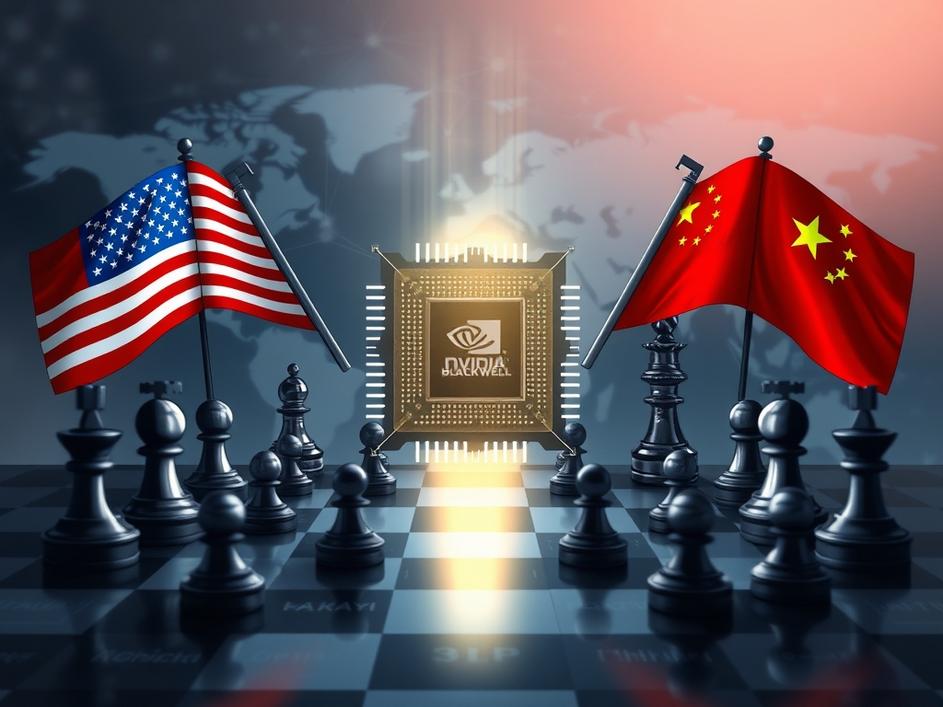


We are a digital agency helping businesses develop immersive, engaging, and user-focused web, app, and software solutions.
2310 Mira Vista Ave
Montrose, CA 91020
2500+ reviews based on client feedback

What's Included?
ToggleIn today’s world, microchips aren’t just tiny pieces of silicon; they’re the core of everything. They power our phones, our cars, and, most importantly, the incredible advances in artificial intelligence (AI). When you hear about a company like Nvidia, you’re hearing about a leader in making these super-powerful AI chips. The future of AI, and with it, national power and economic strength, really depends on who has access to the best chips. This is why a recent comment from former President Donald Trump caught my attention, and why it’s worth talking about. He mentioned that the new, super-advanced Nvidia Blackwell chip wasn’t part of his discussions with China’s President Xi. On the surface, it sounds like nothing happened, but sometimes, what’s *not* said, or what’s specifically said to have *not* been said, tells a much bigger story about the complex dance between the US and China, and the huge pressure on tech companies stuck in the middle.
Let’s talk about why the Blackwell chip matters so much. This isn’t just any chip; it’s a new generation of hardware designed to push the limits of AI computing. Think about the incredible things AI is doing now, from creating realistic images to powering complex scientific research. To do all that, and to do even more in the future, you need immense processing power. That’s what the Blackwell is supposed to deliver. It’s like going from a regular car to a rocket ship. For any country, having access to this kind of technology isn’t just about economic advantage; it’s also about national security. AI can be used for defense, for intelligence, and for maintaining a competitive edge in almost every industry. So, when we talk about this chip, we’re really talking about a key piece of the puzzle for future global leadership. The ability to buy, use, or even copy such tech is a critical battleground.
The relationship between the US and China has been rocky for a while, especially when it comes to technology. Both countries are trying to lead the world in AI, and advanced chips are at the heart of that race. The US has been worried about China’s rapid tech growth, partly because of national security concerns and partly to protect its own tech advantages. This has led to the US putting rules in place, trying to limit China’s access to cutting-edge chips and the tools needed to make them. It’s a bit like a high-stakes game of chess, where each move tries to block the other side’s progress. Companies like Nvidia, which make these essential chips, find themselves in a tough spot. They want to sell their products globally, including to a massive market like China, but they also have to follow the rules set by their home country, the US. This creates a constant tension: how do you balance business goals with national interests?
For Nvidia, this whole situation is a balancing act. They’re a hugely successful American company, but a significant part of their revenue often comes from international markets, including China. When the US government puts restrictions on selling certain advanced chips to China, it directly impacts Nvidia’s business. They’ve had to adapt, sometimes creating slightly less powerful versions of their chips – often called ‘de-tuned’ chips – specifically for the Chinese market, to try and still serve that demand without breaking US rules. It’s a complicated strategy, and it shows just how much pressure they’re under. My take is that Nvidia is trying to keep its standing as a global leader while navigating these tricky political waters. They need to innovate and grow, but they also need to make sure they’re not accidentally helping a rival power in ways their own government doesn’t approve of. It’s a high-wire act with big money and big national interests at stake.
So, what does it mean when Trump says the Blackwell chip wasn’t discussed with Xi? It’s interesting because if it wasn’t discussed, why even bring it up? This comment, in my opinion, sends a few subtle signals. First, it might be a way of confirming that the US is still serious about limiting China’s access to this critical technology, even if the topic isn’t on the official agenda for every meeting. It’s like saying, “We both know where we stand on this.” Second, it could be a way of managing expectations, letting the public know that no big breakthroughs or concessions were made on this sensitive tech front. Or, maybe, it just means that some topics are so strategically important, so deeply embedded in ongoing policy, that they don’t need to be explicitly debated in every high-level chat. It could suggest that the US stance on limiting China’s access to leading-edge AI chips is firm and not up for negotiation in casual talks, perhaps handled through different, less public channels. I think it highlights the ongoing, quiet tension that exists beneath the surface of official statements.
This single comment about a chip and a non-discussion points to something much larger. It’s about the deepening divide in global technology, particularly in AI. If the world splits into different tech ecosystems – one led by the US and its allies, another by China – what does that mean for innovation? Will it slow things down, forcing companies to develop different products for different markets? Will it make technology more expensive? My personal perspective is that this tech rivalry will reshape global supply chains, international collaborations, and even how AI itself develops. Companies might have to choose sides, or develop entirely separate lines of business. It’s a huge challenge, not just for the governments involved, but for every tech company and, ultimately, for consumers worldwide. We’re seeing the early stages of a very different future for technology, one where geopolitics plays a much bigger role than before.
In the world of international relations, sometimes the most important messages are delivered not through grand pronouncements, but through subtle hints and what’s left unsaid. Trump’s comment about the Nvidia Blackwell chip, or rather, its absence from discussions with Xi, is a perfect example of this. It reminds us that the competition for AI dominance is fierce, that advanced chips are its lifeblood, and that the US and China are locked in a strategic contest with huge implications. For companies like Nvidia, navigating these waters will only get harder. For the rest of us, it means watching carefully, because the future of technology, economics, and global power is being shaped right now, often in the quiet spaces between official statements.



Comments are closed